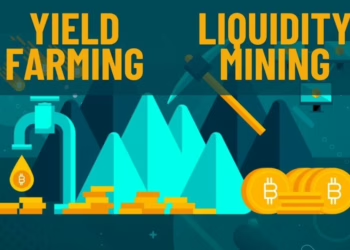Different improvements in user experience have been introduced at various stages of the web’s history. For example, in the early stages of the internet, or “Web1,” only static websites that conveyed information were available.
Given the buzz generated by the concept of a decentralized web, technical discussions have included topics such as the significance of zero-knowledge proof in the Web3 space. The internet transited into Web2, with social media websites occupying the front row. The rise of user-generated content refers to web services focusing more on letting users create their content.
The introduction of Web3 now marks the beginning of a more decentralized internet. At the same time, it’s important to consider whether Web3 solves all of the intended problems.
This article comprehensively explores the concept of zero-knowledge proof and how it contributes to the next generation of internet services and opportunities.
The Background of Web3

The Web (commonly referred to as the World Wide Web) is a graphical information system that provides browsers with an intuitive, graphical user interface through which they can search for and browse content on the internet.
Web1 represents the age of point-to-point information exchange. Most of the time, information is created by a business and stored on a local server. This lets readers interact with it in a single way across different web pages. Examples include Yahoo, Google, Internet Explorer, etc.
Compared to Web1, Web2 is a new age. Although it appears to be a “point-to-point” interactive form, the information is still stored on a centralized server. Examples of this type of internet platform include Facebook, Instagram, WhatsApp, YouTube, etc.
Web3 combines the benefits of Web1 (data ownership) and Web2 (interaction), but the most significant difference is that users now have total control and ownership over their data, which is distributed rather than stored on a single central server. This is exhibited in many DApps used in the blockchain industry, such as Metamask, Uniswap, etc., and is saved in every node that helps run the network.
Since the discovery of zero-knowledge proof, it is now possible to meet both the security and privacy criteria of Web3.
Zero-knowledge proof (which balances privacy and security and has become the primary technology for overcoming Web3 security barriers) allows users to share information privately within the decentralized network while also ensuring that the data they receive from the network is accurate without relying on a third party.
What is Zero-Knowledge Proof?
MIT researchers Charles Rackoff, Shafi Goldwasser, and Silvio Micali proposed zero-knowledge proof (ZKP) as an interactive proof system. Their theory allowed a “prover” to demonstrate to a “verifier” that a specific assertion is true without providing any additional information about the statement.
Zero-knowledge proofs (ZKPs) are mathematical techniques used in cryptography to verify data integrity without revealing the actual data. Their ability to provide scalability and privacy in Web3 applications has made them more popular in recent years.
ZKPs improve efficiency and scalability by allowing a large number of data points to be incorporated into a single, “lightweight” proof. They can help developers make lightweight decentralized applications (dApps) that can run on more accessible hardware, such as mobile phones. This makes Web3 more popular and scalable since blockchain technology requires lots of computing power.
In terms of privacy, ZKPs allow users in Web3 to securely transmit the information required to access goods and services without disclosing personal information that could expose them to identity theft, hacking, and other forms of fraud.
Importance of Zero-Knowledge Proofs in Web3
Zero-knowledge proofs guarantee an undetectable data flow. They are critical for Web3 because people prefer more immersive experiences. Web3 provides this experience as it is superior to previous versions of the internet.
Upgrades to the previous iteration of the internet are required and would attract more users. Web3 can also make it possible to access more internet features at the same time. Malicious agents would find fewer points of data exposure as more users embrace the Web3 revolution.
The big question is, “Will users accept Web3 if they discover that the solutions jeopardize their data?”. The significance of zero-knowledge proof for Web3 and its future can be seen here. As previously stated, zero-knowledge proof is a cryptographic method that allows two parties to exchange anonymous information.
You can access your email without entering your password, for example. So, how can that be possible? After all, usernames and passwords are crucial components of the internet’s security framework.
Since passwords cannot be eliminated from the equation, zero-knowledge proofs are essential for the development of Web3. The foundation of the internet is similar to a gated community. You access the community, or online service, by entering the key or password. Besides password improvements, the growth of Web2 brought about the use of identities for verification. A user’s account could be compromised if the password information is intercepted during the transfer. Therefore, zero-knowledge proofs guarantee that user information will be protected.
How Can Zero-Knowledge Proof Be Applied in Web3?
Web3 has numerous applications for zero-knowledge proof. Listed below are some of the applications:
Blockchain
Blockchain technologies provide immutability and decentralization. Concerns about the limited privacy of blockchain technology were raised by the availability of audit trails and transaction openness on blockchain networks.
It’s critical to keep in mind that one of the foundational components of the Web3 ecosystem is blockchain technology. As a result, the significance of ZKPs for web3 may be seen in how they alter the privacy standards for blockchain. For instance, zk-SNARK cryptography is used by the cryptocurrency Zcash.
The Layer 2 zk-Rollups also play a key role in the other use cases of ZKPs for blockchain. Zk-SNARKs aid in validation by ensuring full information encryption and only releasing the data required for verification. When examined closely, ZKPs are primarily designed for authentication purposes.
Through a variety of techniques, ZKPs can provide promising advantages for data security on the web. For instance, ZKPs can transform transactions into arithmetic circuits or expression transactions. Other methods, such as elliptic curve pairings and homomorphic encryptions, can also aid in determining the underlying polynomials without revealing any additional information.
Internet of Things (IoT)
The increasing use of the Internet of Things (IoT) also highlights the importance of zero-knowledge proof for the development of Web3. The Internet of Things plays a crucial role in connectivity and synchronization and is steadily taking over the planet. Regardless, the vulnerability of the IoT in cloud storage cannot be overlooked. Integrating ZKPs in sensitive systems such as the Internet of Things can help ensure that information flows without gaps.
Authentication
With zero-knowledge proof, users can be verified without having to disclose private information such as passwords. For example, Polygon ID on Ethereum, for example, helps users secure their privacy on a Web3 platform and assists them in meeting the regulatory requirements of KYC verification criteria. This allows users to decide what information to share and when to share it.
Machine Learning
The creator of a machine learning algorithm can persuade people of the model’s outcomes using zero-knowledge proof without revealing any information about the model itself.
In Conclusion
- When zero-knowledge proofs and crypto are used to create a scalable, private, and secure Web3, there will be an opportunity to create technology that empowers users.
- As Web3 evolves, users’ expectations for performance, privacy, new applications, and protocols will increase. Zero-knowledge proofs will be critical in meeting these expectations.
- Individuals and organizations will keep exploring the application of zero-knowledge proof, despite its numerous flaws. The impressive contributions of ZKP in Layer 2 scalability, privacy computing, security protection, etc., have positioned it to impact Web3 significantly.
- Web3 is designed to implement products with specific values as a goal. In this regard, cryptocurrency has blazed the trail with accomplishments such as the consensus mechanism transition from Proof-of-Work to Proof-of-Stake. It would be exciting to see more applications of zero-proof knowledge as blockchain technology and cryptocurrencies continue to gain widespread adoption.
If you would like to read more market analysis articles like this, visit DeFi Planet and follow us on Twitter, LinkedIn, Facebook, and Instagram.
“Take control of your crypto portfolio with MARKETS PRO, DeFi Planet’s suite of analytics tools.”




















